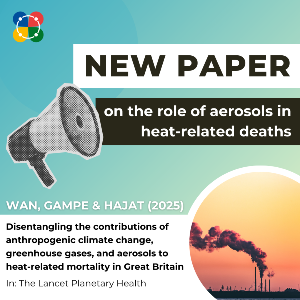New Paper: The role of aerosols on heat-related deaths
22 May 2025
Dr. David Gampe has co-authored the new study in The Lancet Planetary Health.
22 May 2025
Dr. David Gampe has co-authored the new study in The Lancet Planetary Health.

Dr. David Gampe co-authored a new study in The Lancet Planetary Health led by Dr. Kai Wan and Prof. Shakoor Hajat (London School of Hygiene and Tropical Medicine), investigating an often-underrepresented factor in climate-health research: the temperature effect of aerosols. Aerosols are small particles suspended in the atmosphere that reflect sunlight and may have a net cooling effect on the climate.
In this study, the authors modelled the heat-related mortality in Great Britain from 1850 to 2100. Using historical data and future projections, they disentangled the respective roles of green house gases and human-driven aerosols on air temperature.
The results show
Why this matters
Most health impact assessments treat human-driven climate change as a single, aggregated factor. This study shows why it’s essential to distinguish: to enable transparent attribution, inform equitable loss and damage funding, and avoid unintended consequences of climate policy.
While many air pollution policies align with climate action (e.g. switching to renewable energy), some short-term air quality measures may reduce aerosol levels faster than greenhouse gas emissions decline – potentially intensifying warming.
However, it is important to clarify that the direct, negative health impact of aerosols was not studied here but (very likely) exceeds their positive effect through net cooling by a great bit. Still: Coordinated policy design is essential to avoid potential trade-offs!
Read the article